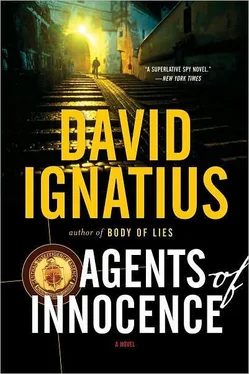David Ignatius - Agents of Innocence
Здесь есть возможность читать онлайн «David Ignatius - Agents of Innocence» весь текст электронной книги совершенно бесплатно (целиком полную версию без сокращений). В некоторых случаях можно слушать аудио, скачать через торрент в формате fb2 и присутствует краткое содержание. Жанр: Шпионский детектив, на английском языке. Описание произведения, (предисловие) а так же отзывы посетителей доступны на портале библиотеки ЛибКат.
- Название:Agents of Innocence
- Автор:
- Жанр:
- Год:неизвестен
- ISBN:нет данных
- Рейтинг книги:3 / 5. Голосов: 1
-
Избранное:Добавить в избранное
- Отзывы:
-
Ваша оценка:
- 60
- 1
- 2
- 3
- 4
- 5
Agents of Innocence: краткое содержание, описание и аннотация
Предлагаем к чтению аннотацию, описание, краткое содержание или предисловие (зависит от того, что написал сам автор книги «Agents of Innocence»). Если вы не нашли необходимую информацию о книге — напишите в комментариях, мы постараемся отыскать её.
Agents of Innocence — читать онлайн бесплатно полную книгу (весь текст) целиком
Ниже представлен текст книги, разбитый по страницам. Система сохранения места последней прочитанной страницы, позволяет с удобством читать онлайн бесплатно книгу «Agents of Innocence», без необходимости каждый раз заново искать на чём Вы остановились. Поставьте закладку, и сможете в любой момент перейти на страницу, на которой закончили чтение.
Интервал:
Закладка:
“It all looks very civilized around here,” she said. “But you and Tom shouldn’t forget that there are Indians just over the hill. Looking for scalps. And white women!”
She downed her drink and was off.
Rogers was seated at dinner between the wife of the Lebanese Army general and the wife of the French charge. Both turned to him nearly in unison when they were seated, both staring up coquettishly at the tall and attractive new American in town.
Protocol won out and Rogers turned to the wife of the Lebanese general. She was a flower of Lebanese Christian society: the daughter of one of the great families that ruled a part of the Lebanese mountains; dressed in the style of East Beirut, like a fine china doll, elaborately coiffed and manicured; feminine and flirtatious in her conversation, but also smart and tough.
“So who is this Mr. Rogers who has joined the American Embassy?” she said, studying Rogers’s face.
Rogers smiled and adjusted his black bow tie. He told her a little about himself: where he had grown up, where he had served previously, what he liked about America.
“Tell me,” demanded Madame Jezzine, “How is it possible to live in so democratic a country? That is what I have never understood. How can you organize things when there is no upper and lower, when everyone is the same? Isn’t it very confusing?”
“Not at all,” said Rogers. “We have no history in America. So we can invent ourselves in whatever shape we like.”
Rogers smiled at the Lebanese woman and took a drink of his wine. Madame Jezzine, who had already emptied her glass, signalled the waiter for more.
“I think it sounds very tiring,” she said. “Here in Lebanon it is very different, as you will see. Here we know exactly who everyone is. If a man tells you his name and his village, you know everything there is to know about him. And if you travel from his village to the next one over the hill, you enter a completely different world. A different religion, different customs, different accent, sometimes even different words.
“It is a great sport here in Beirut to imitate the accents of our rural cousins,” continued Madame Jezzine.
“For example?” said Rogers.
“Take Zahle, in the Bekaa Valley. We have a friend from there named Antun-Tony-who speaks like a primitive. A cave man.” The aristocratic woman had a mischievous look on her face.
“Here, I will show you,” said Madame Jezzine. And in a loud voice, she proceeded to utter a vulgar Arabic expression as it would be spoken by someone from the district of Zahle.
Heads turned around the dinner table and there was a sudden silence.
Fortunately, Ambassador Wigg, who sat on the other side of the Lebanese woman, understood scarcely a word of Arabic.
“That sounds interesting!” he said loudly, eyebrows aflutter.
Madame Jezzine turned to him with a gracious smile and told him sweetly that it was a Lebanese folk saying, popular with rural folk, and had no meaning whatsoever. The ambassador laughed vigorously, to share in the joke, and then engaged Madame Jezzine in an earnest conversation about their respective children.
About that time, Rogers felt a slight brush against his leg. It was the French diplomat’s wife, reaching for her napkin, which she seemed to have dropped. Rogers retrieved it for her and embarked on a pleasant and flirtatious conversation in French, in which the subject of children did not come up once.
Toward the end of the meal, Madame Jezzine turned again to Rogers.
“It is a scandal, don’t you think, what the Palestinians are doing to my country?”
“I beg your pardon?” said Rogers.
“I said,” repeated the Lebanese woman much more loudly, “I think it is a scandal that the Palestinians are taking over Lebanon.”
There was dead silence around the room. The ambassador was too startled to say anything.
Rogers stepped into the void.
“The Palestinians are welcome to try, but I suspect even they would have difficulty taking over such a complicated country as this.” Several people laughed nervously.
“No, I mean it!” continued Madame Jezzine. She was determined to have her say.
“No one will speak up about it. The Palestinians have bought the politicians. They have bought the journalists. Now they are buying the Lebanese Army!”
Sally Wigg rose from her seat.
“I believe coffee is ready for us in the living room,” she said icily.
“It’s true!” insisted Madame Jezzine above the commotion of people rising from their chairs and heading toward the living room. At that very moment, Bianca Garrett arrived and suggested to the Lebanese general’s wife that they might go together to the ladies room and freshen up.
Rogers made small talk in the living room with General Jezzine, who headed Lebanon’s intelligence service. He promised to call on the general when he was settled. The incident with Madame Jezzine seemed to be forgotten over brandy and cigars, but as the Rogers’s said goodnight to their hostess, Mrs. Wigg gave Rogers a tart look, as if to say: This was your fault, young man. Attractive men who flirt with older women are courting disaster.
5
Beirut; October 1969
Rogers thought of his wife in the moments before sleep. He felt her lustrous black hair brushing gently against his neck and her breasts full against his chest. He liked so much softness. Other embassy wives seemed to Rogers as tough as shoe leather. They adopted the clannish manners of the girls’ schools where most of them had been educated, gave lavish parties, drank too much, talked too much. They prodded their husbands for details of their work and gossiped to each other about embassy life.
Jane was different. She never ventured near Rogers’s work. When someone from the embassy brought up the subject, or asked her what her husband was working on, she would laugh and say honestly: “I don’t know. I never ask him.”
They had met while Rogers was a student at Amherst in the 1950s. Jane was a student at Mt. Holyoke, an intense, hardworking girl who turned down dates so that she could study on weekends. She was an English major and liked, in those days, to talk to Rogers about such things as “the new criticism” and the different types of ambiguity in poetry, and whether Charles Dickens was, in fact, the greatest novelist who ever lived.
Rogers met her at a mixer and asked her out for a month before she finally accepted. She was a dreamgirl of the fifties: a slim waist, curvaceous figure, and the dark hair that seemed to make her skin look whiter than ivory. Rogers became infatuated with her on the first date and told his roommate that he had met the girl he would marry. She was a virgin, and Rogers pursued her lustily, half-disappointed when she removed his hand from beneath her dress and half-pleased.
Jane fell in love with Rogers, slowly and completely, with the passion of a woman who would fall in love only once. Rogers seemed to her older than the college boys she had dated. He was handsome, determined, occasionally taciturn, yearning for things outside the class-bound world of Amherst and New England, driven to succeed by forces that Jane couldn’t understand. She teased him on one of their early dates that he was a new type of ambiguity. But gradually she grew to trust him, and her trust, once given, was total.
They were married the summer after graduation, on a perfect July day at an Episcopal church in Morristown, New Jersey. Though they seemed the perfect Ivy League couple-the dashing young man from Amherst and the chaste English major from Mt. Holyoke-the marriage bridged what in those days was still a wide social gap between Protestants and Catholics. He was an Irish Catholic, the son of a police captain from Springfield, Massachusetts. She was a Yankee Episcopalian, the daughter of a former Army intelligence officer who liked to be called “Colonel” and commuted to a stock brokerage firm on Wall Street. Parents on both sides were suspicious and prickly.
Читать дальшеИнтервал:
Закладка:
Похожие книги на «Agents of Innocence»
Представляем Вашему вниманию похожие книги на «Agents of Innocence» списком для выбора. Мы отобрали схожую по названию и смыслу литературу в надежде предоставить читателям больше вариантов отыскать новые, интересные, ещё непрочитанные произведения.
Обсуждение, отзывы о книге «Agents of Innocence» и просто собственные мнения читателей. Оставьте ваши комментарии, напишите, что Вы думаете о произведении, его смысле или главных героях. Укажите что конкретно понравилось, а что нет, и почему Вы так считаете.












